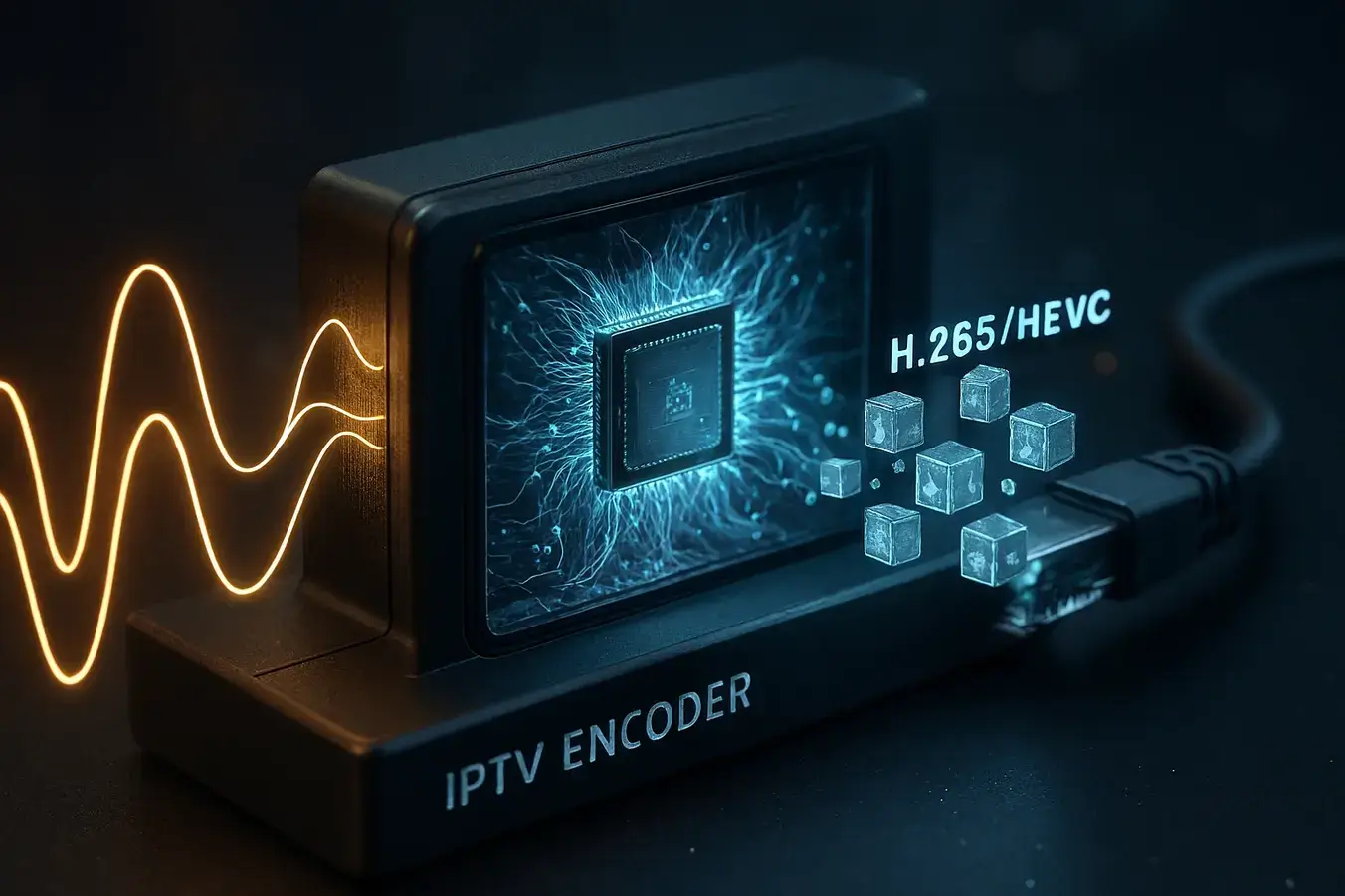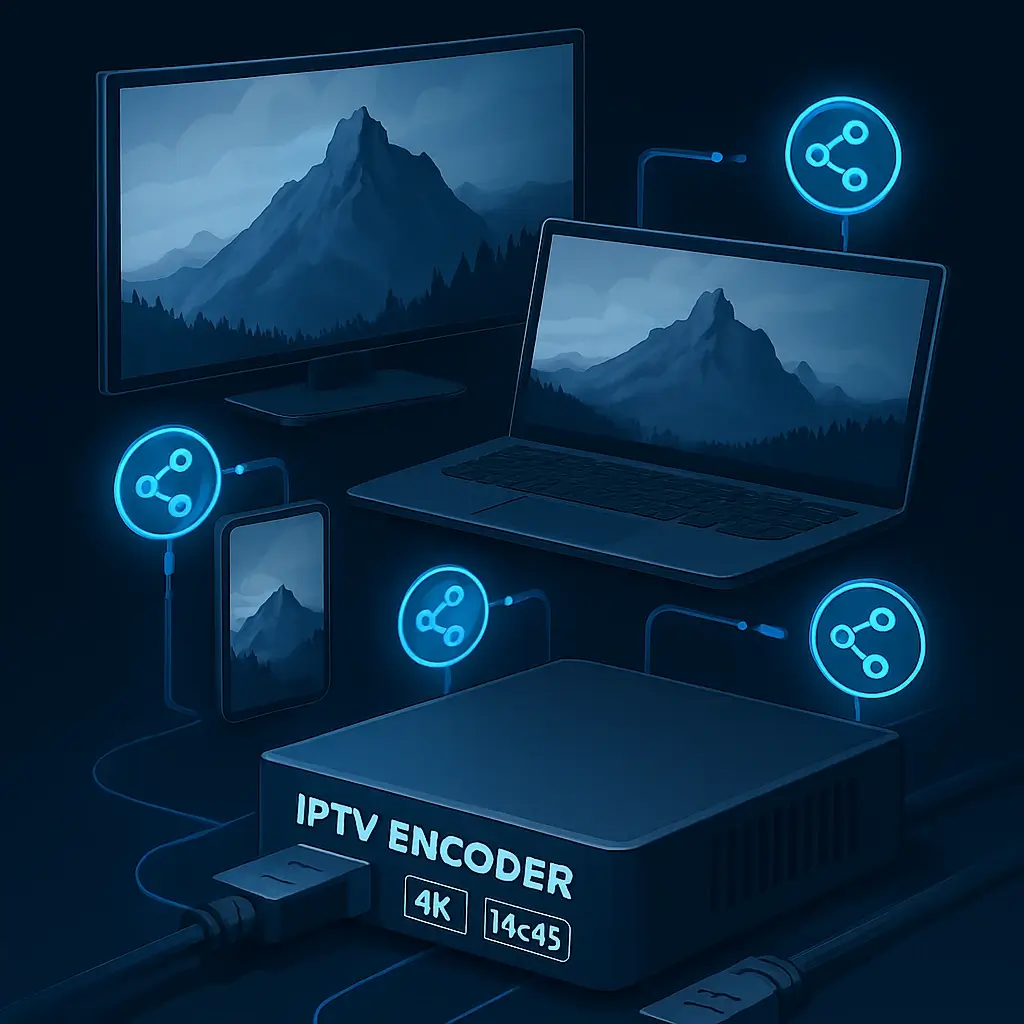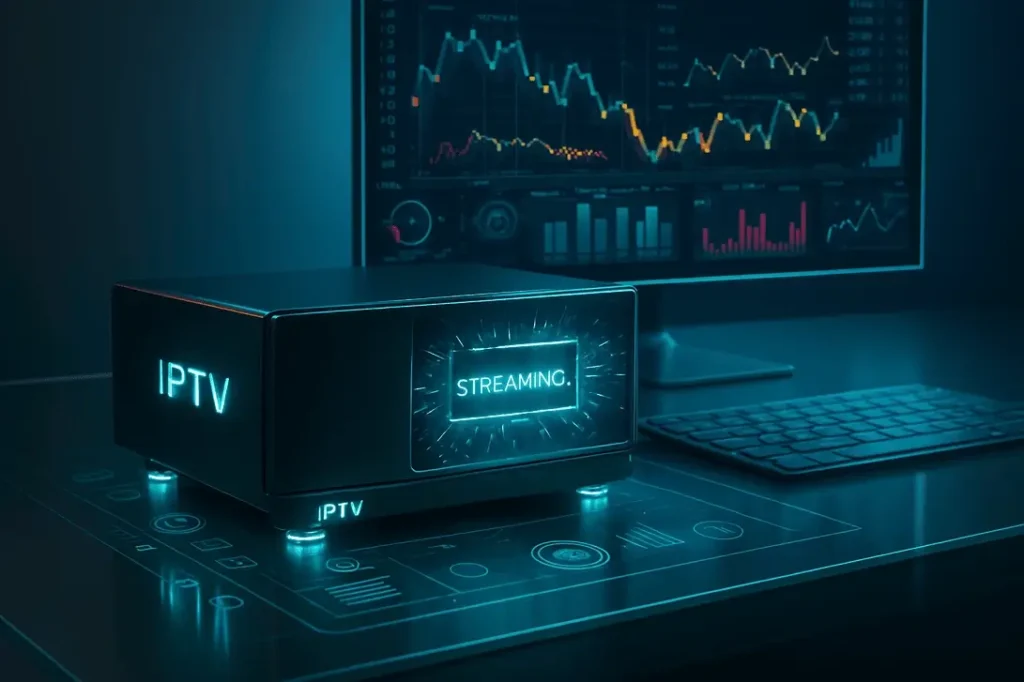IPTV Encoder Guide 2026 – Everything You Need to Know

⚠️ Disclaimer: This article is for educational purposes only. SHOROC promotes legal use of IPTV encoders and streaming solutions. Users are responsible for complying with local copyright laws. Unauthorized distribution of copyrighted content is illegal and not supported by SHOROC.
Introduction
In 2026, the demand for reliable IPTV streaming has never been higher. At the heart of every high-quality IPTV setup lies a crucial piece of technology: the IPTV encoder. Whether you are a content creator, broadcaster, or IPTV enthusiast, understanding how IPTV encoders work is essential for delivering smooth, high-definition streams to your audience.
An IPTV encoder converts video input from cameras, HDMI devices, or SDI sources into digital data that can be streamed over IP networks. This technology allows live events, surveillance feeds, and IPTV entertainment to reach viewers globally without buffering issues.
At Shoroc, we’ve tested multiple IPTV encoders across all price ranges—from IPTV encoders under $500 to high-end 4K IPTV encoders costing over $2500. This guide will explain how encoders work, the different types, price ranges, and tips to choose the best one for your setup.
For a full overview of IPTV technology, check our IPTV Guide.

What Is an IPTV Encoder?
An IPTV encoder is a device or software solution that converts analog or digital video signals into IP streams, which can then be distributed to multiple viewers over a network. Encoders are essential for delivering content to Smart TVs, computers, mobile devices, and IPTV set-top boxes.
There are several types of IPTV encoders, including HDMI IPTV encoders, SDI IPTV encoders, and 4K IPTV encoders. Each type serves different use cases, from home streaming setups to professional broadcasting environments. Encoders also support different compression formats such as H.264, H.265, and HEVC, impacting video quality and bandwidth efficiency.
Types of IPTV Encoders
HD IPTV Encoder – Ideal for high-definition 1080p streaming.
4K IPTV Encoder – Provides ultra-high-definition video for professional broadcasting.
HDMI IPTV Encoder – Accepts HDMI input, perfect for cameras, computers, and TVs.
SDI IPTV Encoder – Professional-grade encoder used in studios and live production.
Channel Capacity
4 Channel IPTV Encoder – Suitable for small-scale streaming setups.
8 Channel IPTV Encoder – Ideal for mid-sized broadcasting solutions.
16 Channel IPTV Encoder – Enterprise-grade encoders for large-scale events, universities, or broadcast networks.
A high-quality IPTV encoder ensures that your streams are smooth, reliable, and scalable.
How IPTV Encoders Work
IPTV encoders function by taking input from cameras, media players, or other video sources and converting it into a digital IP stream. This process involves compression, packetization, and transmission over local networks or the internet.
For example, an H.265 IPTV encoder compresses video more efficiently than H.264, allowing higher resolution streams without consuming excessive bandwidth. Meanwhile, 4K IPTV encoders are designed to handle ultra-high-definition video for professional studios or live events.
A key consideration is legality. Using an encoder to distribute copyrighted content without permission is illegal. SHOROC emphasizes that all recommendations focus on legal streaming applications, including corporate webinars, educational broadcasts, or personal media sharing.

Different Types of IPTV Encoders
1. HDMI IPTV Encoders
HDMI encoders are designed for convenience and portability. They capture video directly from HDMI sources, such as cameras, gaming consoles, or media players. These encoders are suitable for small studios, live streaming, and on-the-go broadcasting.
Pros and Cons:
| Pros | Cons |
|---|---|
| Easy setup | Limited professional features compared to SDI |
| Affordable options under $500 | May not support large-scale multi-channel streams |
| Portable for field use | Some models have limited codec support |
2. SDI IPTV Encoders
SDI encoders are more robust and intended for professional broadcasting. They can handle multiple input channels, support long cable runs without signal loss, and integrate with studio-grade video equipment.
Pros and Cons:
| Pros | Cons |
|---|---|
| High reliability | More expensive (usually $1000+) |
| Supports professional video standards | Bulkier than HDMI encoders |
| Ideal for multi-channel setups | Requires technical knowledge to operate |
3. 4K IPTV Encoders
4K encoders provide ultra-high-definition video streaming. These are perfect for corporate events, educational broadcasts, or live concerts where image quality is critical.
Pros and Cons:
| Pros | Cons |
|---|---|
| Ultra-high-definition output | High cost (often over $2000) |
| Future-proof technology | Requires high bandwidth |
| Compatible with H.265 / HEVC | More complex setup |
👉 New to IPTV? Read our complete IPTV Guide to get started.
Price Guide – What to Expect in 2026
IPTV encoders vary widely in price, reflecting their performance, channel capacity, and features:
Under $500 → Entry-level, 1-4 channels, basic HD streaming.
$500–$1000 → Mid-range, better compression (H.265), 4-8 channels.
$1000–$2500 → Professional HD and 4K encoders, multiple channels, enhanced reliability.
Over $2500 → Enterprise-grade, multi-channel 4K encoders, low latency, full HEVC support.
💡 Tip: For small IPTV projects, an IPTV encoder under $1000 is sufficient. For professional services, investing in a 4K IPTV encoder over $2000 ensures high-quality performance.
Key Features to Consider
When selecting an encoder IPTV, consider channel capacity, input type, supported codecs, resolution, and compatibility with streaming platforms. Advanced models offer encryption, VPN compatibility, and reliability features that ensure secure and uninterrupted streaming.
Price categories vary widely: from encoders under $500 for small setups to over $3000 for enterprise-grade systems. SHOROC recommends matching your encoder to your streaming needs, channel capacity, and budget.
Popular IPTV Encoder Models
Based on testing, SHOROC recommends several reliable models:
PVI HD Professional IPTV Encoder – High-end, supports multiple channels, and H.265 compression.
Vecaster 4K IPTV Encoder – Excellent for ultra-HD streaming and corporate events.
4 Channel HDMI IPTV Encoder – Affordable, ideal for small studios.
All these models support legal streaming applications, encryption for security, and multiple input types. For a detailed setup guide, visit our IPTV Setup Guide.
Legal & Compliance Considerations
Legality is a crucial aspect often overlooked by new IPTV users. Using encoders to stream copyrighted content without authorization can lead to fines or legal action. SHOROC promotes legal use cases such as:
Corporate or educational broadcasts
Personal media sharing among family or friends
Events for which you own the rights
Additionally, using VPN or encryption with encoders should only be for security and privacy, not bypassing content restrictions.
How to Choose the Right Encoder IPTV
Choosing the right encoder involves balancing features, price, and your streaming needs. Consider:
Resolution Needs – HD or 4K
Channel Requirements – Single or multi-channel
Compression Codecs – H.264 vs H.265 / HEVC
Legal Compliance – Ensure you own rights to stream content
Budget & Longevity – Under $500 for beginners, over $2500 for enterprise-grade
SHOROC recommends testing encoder performance and reliability before committing to large-scale deployments. For more in-depth comparisons, check our IPTV Guide.
Conclusion
Choosing the right IPTV encoders requires understanding technical features, budget constraints, and legal compliance. From HDMI to SDI and 4K encoders, each type serves a distinct use case, and selecting wisely ensures high-quality, uninterrupted streaming. SHOROC’s testing and guidance guarantee that you get reliable, secure, and legal solutions for your IPTV needs.
FAQs
What is an HD IPTV encoder?
An HD IPTV encoder converts high-definition video into a digital IP stream suitable for legal streaming to multiple devices.
How does a 4K IPTV encoder work?
4K IPTV encoders capture ultra-high-definition video and compress it efficiently for IP distribution while maintaining top quality.
Can I buy an IPTV encoder under $500?
Yes, entry-level HDMI IPTV encoders are available under $500 for small-scale or personal streaming.
Difference between HDMI and SDI IPTV encoders?
HDMI encoders are portable and easier to set up, while SDI encoders are professional-grade, support long cable runs, and multi-channel inputs.
Are H.265 IPTV encoders better than H.264?
H.265 encoders offer higher compression efficiency, better image quality, and lower bandwidth usage compared to H.264.
Where to find IPTV encoders nearby?
Professional electronics stores and verified online retailers carry encoder for IPTV. SHOROC recommends purchasing from authorized distributors.
Best 4 channel IPTV encoder for small streams?
Entry-level HDMI 4-channel encoders provide a balance between cost and functionality for small studios.
Can a 16 channel IPTV encoder be used for live events?
Yes, multi-channel encoders like 16-channel PVI models are designed for live event broadcasting.
What is IPTV encoding and why is it important?
IPTV encoding converts video into IP streams, enabling reliable and high-quality streaming to multiple devices. Proper encoding ensures smooth playback and efficient bandwidth usage.
Does SHOROC offer recommendations for secure IPTV encoders?
Yes, SHOROC provides expert guidance and tests encoders for secure, reliable, and legal IPTV streaming.
